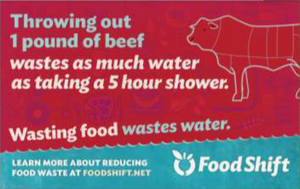Resources for the City of South Bend Food Waste Prevention Plan
- Student
- Katie Sylva
- College(s)
- Mendoza College of Business
- Faculty Advisor
- Jessica McManus-Warnell
- Class Year
- 2015

Food waste prevention and repurposing is often the next step for sustainability advocates in municipalities. The alarming fact that drives the food waste movement are forty percent of all post-harvest food is wasted each year in the United States at a cost of $165 billion dollars. Municipalities struggle to capture food waste due to the difficulties of collecting, transporting, and repurposing organics.
The City of South Bend already has a yard waste collection system but is seeking recommendations and ideas for food waste. My capstone explores a variety of resources that I have synthesized through internship experiences, my leadership roles in two student club project groups, my own research, and participation in the 2014 Zero Food Waste Forum. The recommendations made within each section were found via practical experience, interviews with the organizations, and journals. Below are brief descriptions of some of the resources I explored in my capstone:
Zero Food Waste Forum
The Zero Food Waste Forum was a conference hosted by the Northern California Recycling Association at the University of California, Berkeley, in October 2014. The conference brought together food waste prevention experts from 16 states and 6 different countries to share their learnings from the programs they organize. This section of the report includes a synthesis of the recommendations and lists the tools they shared. The information highlights how to engage consumers in food waste prevention behavior and thought.
BlueBucket
BlueBucket is a social enterprise in the pilot stage of implementation in five restaurants in the South Bend community with five charity partners. Through a partnership with BaseND, I led a group of students in creating ideas for community engagement. Personally, I conducted research for BlueBucket that further develops their customer mapping experience for restaurant consumers who encounter social good programs. This section of the capstone explores consumer behavior and preferences for each stage of the restaurant experience.
Satisfeito
The word satisfeito in Portuguese means to be satisfied and express gratitude for the meal served. In the world, forty-five percent of deaths among children are attributed to poor nutrition, and sixty-six million children in primary education attend school hungry2. Unfortunately, too many children are not familiar with the feeling of satisfeito. Additionally, forty percent of all post-harvest 2 World Food Programme Hunger Statistics 5 food is wasted each year in the United States at a cost of $165 billion dollars3. Inspired by these social issues, the Alana Institute in Sao Paulo, Brazil, created the Satisfeito project that fosters a coming together of consumers, restaurants, and social organizations to fight hunger and food waste across the world. Satisfeito is a unique business model that the City of South Bend could promote to restaurants in the region.
Food Waste Repurposing
Food production institutions are faced with the problem of disposing food waste. From my experience as an intern for Dairy Management Inc., I created a business model for the University of Notre Dame to repurpose food waste from the dining halls. The research I conducted as a part of the project included interviews with universities currently repurposing food waste and stakeholders in the food waste repurposing chain in the South Bend area. From the interviews, I have summarized the challenges large institutions face when looking to repurpose food waste. I also included the relevant information and contacts for repurposing food waste in the South Bend area.